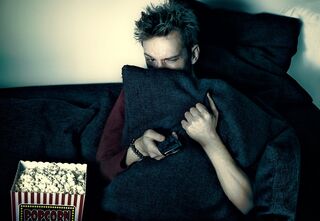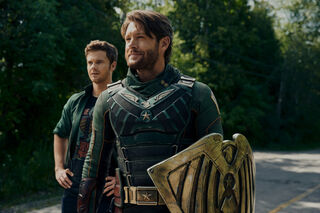Media
Why Does Watching Dystopian Shows Feel So Good?
Reasons from research and "The Boys" showrunner Eric Kripke.
Posted October 1, 2022 Reviewed by Vanessa Lancaster
Key points
- Horror and dystopian movies, television, and books can be surprisingly therapeutic and satisfy our curiosity about the "dark side" of humanity.
- Watching frightening media can lower anxiety by safely building emotional regulation skills and helping people feel more prepared.
- Fictional media that reflects frightening aspects of real life, like the popular show "The Boys," can be validating and ultimately hopeful.

One might assume that most people would be drawn to media that feels safe and familiar in a world that can feel increasingly unsafe. In fact, in the early days of the pandemic, many people returned to watching old favorite television shows that felt like a "comfort place."
However, dystopian or horror stories can be therapeutic for many people. If that sounds counterintuitive, but you find yourself loving The Walking Dead or The Boys or the latest Stephen King novel, there is an explanation.
Emotion Regulation Takes Practice
As odd as it sounds, this type of media can lower anxiety. Frightening or violent scenes in horror movies bring a surge of adrenaline and cortisol, the so-called stress hormones, similar to the fight or flight response we experience in real danger. We’re well aware that we’re perfectly safe, so our emotion regulation skills generally kick in quite effectively to moderate those emotions. Choosing to experience fear in an environment where you have control like this can bring some psychological benefits.
Horror fans have more practice regulating emotions, and some studies suggest they may be better at it as a result, using fewer avoidance mechanisms in response to fear. In addition, if someone is experiencing persistent anxiety about real-life concerns (and who isn’t right now?), dystopian and horror media can be a great escape, temporarily shifting the perceived threat from real life to fiction.
Finally, the aftermath of the adrenaline and cortisol rush we get from watching this sort of media is a global reduction in brain wave activity that results in a positive mood, much like a runner gets a “high” after the stress imposed on the body. For viewers with high sensation-seeking personality traits and intellect/imagination, dystopian and horror media may be particularly enjoyable.
Preparing for the Worst
Research has also found that when people engage with dystopian stories, they can serve as simulations of real-life experiences that might be faced, which helps people feel more prepared. A study of horror and apocalyptic film viewers during the Covid-19 pandemic found they had greater psychological resilience when facing real-life pandemic challenges and felt more prepared to encounter analogous real-life situations. What horror and dystopian media depict may not be real but often reflects frightening situations in the real world–violence, racism, sexism, powerlessness, disenfranchisement.
Investigating the Dark Side
Watching this type of entertainment can also help us satisfy our curiosity about the darker side of humanity, what Jung called our "shadow side." We probably wouldn’t want to meet Hannibal Lecter in real life, but many of us are fascinated by what people are capable of–as long as we’re safely separated from them!
Fictional stories that reflect our real-life concerns have become increasingly popular, perhaps because they serve some of the functions described above. But which ones fit the bill?
How The Boys Found the Sweet Spot
Research shows there’s a “sweet spot” of media that’s just scary or disturbing enough but not overwhelming, with an underlying message of hope and resilience that can be inspiring.
In 2022, the Prime Video series The Boys hit that sweet spot for many people. Based on the comics by Garth Ennis and Darick Robertson, the show is a darker take on superheroes, imagining what would happen if some people really did have superpowers. The series depicts many challenges we face in real life, from racism to sexism to toxic masculinity.
The Boys is not a traditional horror show but a dystopian fantasy that reflects reality in a way that may be even more terrifying. I spoke with the showrunner of the streaming show, Eric Kripke, about whether he thinks this is one reason why The Boys has resonated with fans so strongly.
Eric: "With traditional horror, it’s like the same emotion as a roller coaster, right? It’s the feeling of death while being completely safe, and then people can process all their fears. I think The Boys is slightly different in that–as you say, it’s meant to hold up a mirror on the world we’re living in. My guess is some people find that comforting, and others find it disturbing, and I think those are equally appropriate responses.
"The feeling we have in the writers’ room, at least in terms of the part that’s reflecting the world, isn’t what it was on [one of Kripke’s previous shows] Supernatural–let people face their fears so they can process them. It’s a lot more like, we’re angry! And we’re going to have our writer therapy of processing how scary and upsetting and angering it is to all of us, and then let’s see if other people connect to it.
"I think what it ends up doing is people find out that they’re not alone, which I think is comforting when you watch a show like this and say, 'oh wait, these guys are absolutely terrified of all the things I’m terrified of.' That 'even if there isn’t a solution, I know I’m not in this by myself.' I think there’s therapeutic value in that, at least."
In other words, in some ways, the monstrous societal issues depicted in The Boys are scarier than any of the fictional monsters that are more displaced from reality.
In the show's most recent season, many fans felt that the real-life parallels were even more explicit. Kripke agreed.

Eric: "It’s a funhouse version of our world, but it’s like our world, and the superheroes are just a metaphor for all the stuff that’s really happening. There’s an endless fire hose of real-life horror that’s overwhelming, so when you have a show that has the opportunity to comment on the world, you have to. You can’t just say, 'Well, let’s tell everyone a comforting lie.' You walk in and say, 'Wow, I’m angrier than I’ve ever been. Let’s dive deeper and make it even more explicit.'"
Another reason for The Boys popularity, especially amid increasing violence and lingering pandemic, may be that despite its graphic and dark themes, the series is nevertheless hopeful in its message of how ordinary people keep fighting for change and in the resilient emotional bonds between the characters.
Eric: "People say to me all the time, is there any hope in that show? And I’m like, maybe it’s just me, but I think it’s a really hopeful show. Because in the face of all the cynicism and overwhelming corporate forces, you have [characters like] Frenchie and Kimiko, and Annie and Hughie, and Mother’s Milk and his daughter, all these relationships that in the face of incredible odds are tender and supportive and loving. I think if the show has any message, it’s the world gets saved by taking care of people you love."
That combination of taking viewers on a fictional ride through depictions of darkness and horror, frighteningly close to reality, but showing us realistic characters who remain steadfastly human, may be just what many of us need right now.
References
Clasen, M., Kjeldgaard-Christiansen, J., & Johnson, J. A. (2020). Horror, personality, and threat simulation: A survey on the psychology of scary media. Evolutionary Behavioral Sciences, 14(3), 213–230
Scrivner, C., Johnson, J.A., Kjeldgaard-Christiansen, J. & Clasen, M. (2020). Pandemic practice: Horror fans and morbidly curious individuals are more psychologically resilient during the Covid-19 pandemic. Personality and Individual Differences, 168




